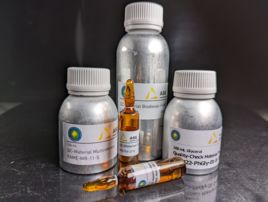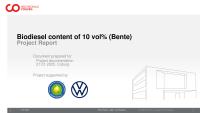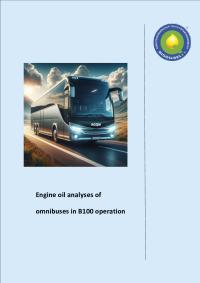
20 Oct 2020
Deposit Formation and Prevention of Deposit Formation Biodiesel
The project Deposit Formation and Prevention of Deposit Formation Biodiesel (DIN EN 14214) carried out at the University of Rostock to investigate the deposit formation tendency of biodiesel and diesel-biodiesel fuel blends was successfully completed. more…
19 Aug 2020
Development of a test method for assessment of material resistance in applications with middle distillate
Within the research project, a forced test method was developed to determine the resistance of metallic and polymeric materials to FAME-containing (B20) fuels made from middle distillates and mixtures of middle distillate and paraffinic hydrocarbons. more…
2 Feb 2019
Biodiesel reduces deposits in common rail injectors
After two years the project "Deposits in common rail injectors – prevention strategies with respect to fuel composition and injection system construction" at the University of Rostock could be completed successfully. more…
28 Feb 2013
FVV Project completed
After a project time of two years the project ‘Biofuel blends’ assigned to Fachvereinigung Verbrennungskraftmaschinen (FVV e.V.) by the University of Rostock could now be finalised. more…
26 Jun 2012
The Biofuels Consortium Programme
Summary report of module 1 – biofuel effects on diesel performance, emissions and economy in conventional and advanced technologies. more…
2 Feb 2012
Biodiesel Lifespan Quality Performance
Biodiesel does not have a negative impact on the filterability of Diesel fuel – this is the resumé of a study of AGQM Qualitaetsmanagement Biodiesel e.V (AGQM) which was now completed in cooperation with the mineral oil companies Total Deutschland GmbH and OMV AG. Diesel fuel according to standard DIN EN 590 contains Biodiesel of up to 7 % V/V. It was the objective of this study to examine any possible quality changes of Biodiesel during its entire lifespan and to assess a potential risk for it impairing the filterability of Diesel fuel. more…
1 Aug 2011
A short study to assess the metal, phosphorus and sulfur content in biodiesel
More than 7900 individual data of the element contents (Na, K, Ca, Mg, P, S) of market-relevant biodiesel samples from the years 2000 to 2010 were evaluated in the present short study. The data bases of the biodiesel quality management working group (AGQM) and the Analytik-Service GmbH (ASG) were used as database. more…
23 Dec 2010
AGQM-project report: "Recommendations for a Mexican biodiesel standard and the Infrastructure required for its handling"
The core objective of this report is to provide a coherent proposal for a Mexican technical standard for biodiesel and its blends based on the actual existing international experiences available in the field. For this purpose the report mentions the relevant quality properties of biodiesel making reference to the existing technical standards of Europe, United States and Brazil.
more…
23 Jul 2010
Study on steryl glycoside content
The processing and refining steps implemented by oil mills for the production of rapeseed and soy oils, intended for the production of Biodiesel, have an impact on the concentration of acylated steryl glycosides (ASG) and steryl glycosides (SG). These minor components – natural components of vegetable oils – are suspected to negatively influence the filterability of Biodiesel. more…
25 Oct 2007
Property Demands on Future Biodiesel
Rapeseed oil methyl ester (RME) is currently not suitable for diesel particulate filters. The boiling characteristic of RME is an additional problem that presumably limits its further usability in Euro VI engines. Currently, hydrogenated vegetable oil (HVO) is in the state of obtaining acceptance as alternative fuel in the German legislation and is in the focus of discussions world-wide. HVO has physical and chemical advantages versus RME. In case RME should continue to be an appropriate fuel its molecule structure must be designed - probably by means of plant breeding. It is important to lower the boiling line by achieving chain lengths between 12 and 16 carbon atoms and to have in mind the oxidation stability by focussing the number and the position of double bonds. Moreover, aspects of emissions and health effects must be kept in mind. Besides plant breeding, research should focus on highly efficient biotechnical transesterification, producing simultaneously shorter chain lengths. The phosphorus and metal contents of future biodiesel must become significantly lower than the specification limits that are valid at present. more…
30 Jun 2007
Measurement of ultra-fine particles in the exhaust gas of diesel engines fuelled with biodiesel
Measurements of exhaust gas were carried out for a heavy-duty engine using four different fuels: biodiesel (B100); fossil diesel fuel; Shell V-Power® diesel fuel; and a blend of Aral Ultimate® diesel fuel with 5% biodiesel. The aim of the underlying research project – entitled “Measurement of ultra-fine particles in the exhaust gas of diesel engines fuelled with biodiesel”– was to examine in detail the increase in ultra-fine particles that is observed when biodiesel is used instead of fossil diesel fuel. An assessment of the risks of exposure to ultrafineparticles was expected as the outcome of the research. more…








